Nine Lives Are Not Enough

Brief Synopsis
Cast & Crew
A. Edward Sutherland
Ronald Reagan
Joan Perry
James Gleason
Howard Da Silva
Faye Emerson
Film Details
Technical Specs

Synopsis
After gangster Moxie Karper threatens to sue the Daily Express for libel, Matt Sawyer, the reporter who wrote the story in question, is demoted to riding with a police patrol car. When the car is called to investigate a dead body, Matt and the two policemen, Sergeant Daniels and Officer Slattery, are excited to discover that the body is that of missing millionaire Edward Abbott. Although the dead man's room is locked from the inside and there is a gun lying next to his head, Matt is convinced the man was murdered, because his hands are still in his pockets. Bolstering this conclusion is the fact that the rooming house where the body was found is next door to Karper's house. Matt calls in the scoop and is reinstated in his editor's good graces, but despite his precautions, another reporter, "Snappy" Lucas, follows the coroner into the house. To maintain his exclusive, Matt removes the distributor caps from all the cars and convinces Roy Slocum, the landlady's retarded son, to tie up the phone lines. When Abbott's daughter Jane and his partner, Colonel Andrews, arrive to identify the body, Matt asks them to help prove that he did not commit suicide. Matt grows suspicious of the Abbott chauffeur, Charles, who seems to be very familiar with the Slocum house, and learns that he is an ex-convict. Jane vouches for Charles, however, adding that her father trusted him despite his record. Nonetheless, Slattery searches Charles's apartment and reports that he is clearly living beyond his means. He also finds a telephone number for Rose Chadwick, who claims to have been Abbott's mistress. When the inquest determines that Abbott committed suicide, Matt is fired. He is still convinced that Abbott was murdered, however, and continues his investigation of Charles. Matt, Daniels and Slattery pursue Charles to Rose's, where they find her packed and ready to leave town. After she receives a threatening phone call, she admits that Charles is her husband and that she never met Abbott. Matt and Daniels rush to Charles's house, believing that he is in danger, and discover him dead in a way that suggests suicide. They return to Rose's to find Slattery unconscious in a bedroom and Rose dead, apparently having jumped from a window. Matt is convinced that Karper murdered them all. Finding Roy alone, Matt questions him, and he admits that his mother knows everything. Jane suggests that she, as a woman, is the right person to question Mrs. Slocum, and despite Matt's protests, she goes to the Slocum house. Mrs. Slocum agrees to tell Jane what she knows about the murders, and a man lurking outside the window of the house pulls out a gun, intending to stop her. Slattery, who has been staking out the house, calls Matt and Daniels, and they arrive in time to prevent the murders. The attacker escapes, but Slattery catches him, and he is revealed to be Andrews, who confesses that after he embezzled money to cover his losses in the market, Abbott threatened to expose him. Andrews then shot Abbott through a ventilator after he locked himself in the room. Andrews killed the others in order to cover up Abbott's murder. Andrews escapes, using Jane as a hostage, but is killed in an ensuing shootout. Jane buys the Express and makes her new fiancé, Matt, the managing editor.

Director
A. Edward Sutherland
Cast
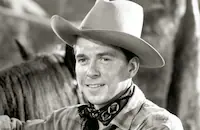
Ronald Reagan

Joan Perry

James Gleason
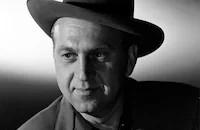
Howard Da Silva
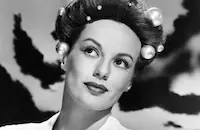
Faye Emerson

Edward Brophy
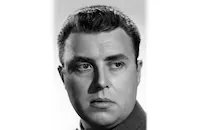
Peter Whitney

Charles Drake
Vera Lewis
Ben Welden
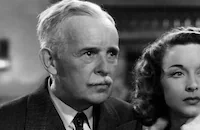
Howard Hickman
Cliff Clark
Tom Stevenson
Paul Phillips

Joseph Crehan
John Maxwell

John Ridgely
Walter Soderling

John Hamilton
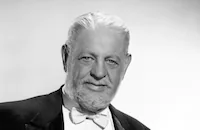
Thurston Hall
Billy Dawson
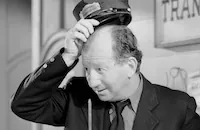
Hank Mann

Jack Mower
Mary Brodel
Frank Mayo
Eddy Chandler
Creighton Hale
Olaf Hytten
Jimmy O'gatty
Crew

Film Details
Technical Specs

Articles
Nine Lives Are Not Enough
It was a standard formulaic genre film, as Reagan later admitted, "You could always count on me to rush into a room, grab a phone and yell, 'Give me the city desk I've got a story that will crack this town wide open'."
Reagan had been going from film to film on the Warner lot, in both "B" pictures and the occasional "A" movie like Dark Victory (1939), but his performance in Nine Lives Are Not Enough caused studio head Jack Warner to take notice, writing "I saw Nine Lives Are Not Enough and it is a peachy picture." As Anne Edwards wrote in her biography Early Reagan, the movie "with its cumbersome title, low budget, short running time (sixty-one minutes) and weak marquee value (Reagan was the major name in the movie), had too many strikes against it to make the grade as a sleeper. Reagan's performance did set the front office to reevaluating his career."
Variety also approved of Reagan, calling him, "not only a brash reporter to end all screen reporters; he's also hilariously scatterbrained and devilishly resourceful. Reagan gives a superbly helter-skelter performance." The film also took kudos for being "crammed with lively action, comic situations and vivid characterizations. It opens with a wallop, has headlong pace and closes with an explosive climax....Yarn is in the form of a blazing whodunit, with suspense piled up and action so fast that the average spectator won't have time for the moment of calm thought needed to the villain. There's a bushel of newspaper stuff of the sort audiences love and although it's exaggerated beyond belief it's nearly all funny."
by Lorraine LoBianco
SOURCES:
The Films of Ronald Reagan by Tony Thomas
Variety review, September 3, 1941
Early Reagan by Anne Edwards
Ronald Reagan in Hollywood by Stephen Vaughn

Nine Lives Are Not Enough
Quotes
Trivia
Notes
News items in Hollywood Reporter report that actress Lucia Carroll was removed from the production because of illness and Ben Stoloff was initially assigned as director.

Miscellaneous Notes
Released in United States 1941
Released in United States 1941














